A new study sheds light on the wide-ranging effects of GLP-1 receptor agonist medications, revealing both promising health benefits and potential side effects. While these drugs are primarily used for weight loss, they appear to offer protection against heart disease, stroke, type 2 diabetes, certain cancers, and even Alzheimer's disease. However, they can also increase the risk of gastrointestinal issues, low blood pressure, and other complications. Physicians need to carefully weigh the advantages and disadvantages when prescribing these medications and ensure patients understand both the potential benefits and risks.
We know now that glucagon-like peptide 1 ( GLP-1 ) drugs for obesity bring with them a whole host of other potential benefits, as well as a handful of side effects . But new research has brought a sharper focus on both the pros and the cons of these medications, and with that comes new challenges and opportunities for physicians to consider when prescribing them.
Researchers studied four GLP-1 receptor agonist medications, namely, Ozempic, Zepbound, Mounjaro, and Wegovy, and identified 175 possible health outcomes in 215,970 people on the medications. They then compared their health outcomes with those in 2.4 million individuals who were not on any weight loss medications. Researchers found that outside of weight loss, patients experienced a laundry list of positive health outcomes, including a reduced risk for heart disease, stroke, type 2 diabetes, certain cancers, and even Alzheimer's disease.A number of pathways seem to be working to make these drugs effective on some conditions seemingly unrelated to weight, said study author Ziyad Al-Aly, MD, chief of research and development at the Veterans Affairs St Louis Healthcare System. For starters, obesity has negative implications for overall health, and by reducing obesity, you’re treating a number of problematic health outcomes. The other pathway is that GLP-1 receptors located all over the body in places like the brain are responsible for impulse control and reward signaling, which may be why the medications work to reduce substance use disorders. They’ve also been shown to reduce inflammation, thereby slowing neuro-inflammation, which has been linked to psychological disorders, including schizophrenia. “These drugs are effective far beyond just being weight loss drugs, but they’re not without risks,” said Al-Aly.The study also showed that along with positive outcomes, there were side effects, including an increased risk for nausea, vomiting, diarrhea, constipation, heartburn, gastroparesis, low blood pressure, fainting, sleep problems, headaches, kidney stones, kidney inflammation, and pancreatitis. Primary care doctors and obesity physicians should have an open dialogue with their patients from the start, consulting with them about things like medication timing, said Carolynn Francavilla, MD, a nationally recognized obesity physician who owns and operates Green Mountain Partners for Health and Colorado Weight Care, both in Denver. When physicians prescribe these medications, they need to ensure their patients are aware of the possible side effects so that they’re not surprised and have a plan in place to deal with them, said Francavilla. Timing the dosage of their medication is important so that the side effects are the least problematic to their lifestyle. The most common GLP-1 medications are once-weekly injections, and people tend to have the worse nausea and vomiting 36 hours after taking them. “Most of our patients choose to take the medication on a Friday or Saturday when those symptoms would be less disruptive to their work or other obligations,” said Francavilla. Dosage is another really important aspect of controlling side effects. The minimal recommended timing for one dose is about 4 weeks. “The two main goals of the medication are weight loss and diabetes management, so patients should stay on the lowest dosage possible until they feel like they’ve plateaued,” said Charu Sawhney, DO, MPH, an internal medicine physician with Harbor Health in Round Rock, Texas. When patients move up on the dosage too fast, they’re going to have more trouble, said Sawhney. “This is when we see the most severe side effects like the malnutrition and dehydration that can sometimes land patients in the hospital,” she said. Patients can also manage gastrointestinal side effects by avoiding certain food groups like heavy, fried, fatty foods which are slower to digest and alcohol which can make patients feel ill. “It’s the foods that we don’t want patients to eat anyway that they tend to become more sensitive to when they’re taking these medications,” said Sawhney. And most importantly, when patients don’t feel as hungry, they’re less likely to drink enough water, which can cause a number of negative health outcomes, including kidney stones and kidney inflammation, said a primary care physician and founder of Misra Wellness in Los Angeles. “A lot of this can be alleviated just by making sure patients are properly hydrated,” she added. Once patients are on these medications, their primary care physician or healthcare provider should be regularly checking in with them both to monitor their vitals and to check on their symptoms. It could mean an in-person or telehealth appointment, communication through a health portal, or a call, but in all cases, physicians need to be checking in and making sure their patients are on the correct dosage of the medication. This might also mean medication adjustments, both for dosage of their GLP-1 and for other medications that the patient might be taking
GLP-1 Obesity Medications Weight Loss Side Effects Health Benefits Cardiovascular Health Diabetes Cancer Risk Alzheimer's Disease
United States Latest News, United States Headlines
Similar News:You can also read news stories similar to this one that we have collected from other news sources.
 GLP-1 Agonists: Navigating Access and Complexities in Obesity CareThis Medscape Masters discussion delves into the challenges and opportunities surrounding the use of GLP-1 receptor agonists in treating obesity, focusing on access issues, patient management, and long-term implications.
GLP-1 Agonists: Navigating Access and Complexities in Obesity CareThis Medscape Masters discussion delves into the challenges and opportunities surrounding the use of GLP-1 receptor agonists in treating obesity, focusing on access issues, patient management, and long-term implications.
Read more »
 The GLP-1 Revolution: A Doctor's Guide to Understanding and Managing These Weight-Loss DrugsThis book offers a comprehensive guide to GLP-1 medications, helping readers understand their benefits, risks, and how to use them effectively. Written by an obesity medicine specialist, it addresses common misconceptions, provides tips for navigating healthcare systems, and offers advice on managing side effects.
The GLP-1 Revolution: A Doctor's Guide to Understanding and Managing These Weight-Loss DrugsThis book offers a comprehensive guide to GLP-1 medications, helping readers understand their benefits, risks, and how to use them effectively. Written by an obesity medicine specialist, it addresses common misconceptions, provides tips for navigating healthcare systems, and offers advice on managing side effects.
Read more »
 Josh Gad Opens Up About Using GLP-1 Drugs for Weight LossActor Josh Gad revealed on a podcast that he is using GLP-1 drugs, such as Ozempic and Wegovy, to manage his weight. He shared his positive experience with the medication, stating it has been a 'miracle drug' in suppressing hunger and aiding in weight loss. Gad acknowledged the importance of a healthy relationship with food and exercise alongside the medication.
Josh Gad Opens Up About Using GLP-1 Drugs for Weight LossActor Josh Gad revealed on a podcast that he is using GLP-1 drugs, such as Ozempic and Wegovy, to manage his weight. He shared his positive experience with the medication, stating it has been a 'miracle drug' in suppressing hunger and aiding in weight loss. Gad acknowledged the importance of a healthy relationship with food and exercise alongside the medication.
Read more »
 GLP-1 Weight Loss Drugs Offer Health Benefits But Carry RisksA new study reveals that GLP-1 injectable weight loss drugs provide additional health benefits beyond weight management, but patients should be aware of potential side effects.
GLP-1 Weight Loss Drugs Offer Health Benefits But Carry RisksA new study reveals that GLP-1 injectable weight loss drugs provide additional health benefits beyond weight management, but patients should be aware of potential side effects.
Read more »
 New Data Shed Light on Who Stops Using GLP-1 Drugs, and WhyA majority with overweight/obesity discontinue within a year, but the rate is higher among those without type 2 diabetes.
New Data Shed Light on Who Stops Using GLP-1 Drugs, and WhyA majority with overweight/obesity discontinue within a year, but the rate is higher among those without type 2 diabetes.
Read more »
 Employers Embrace Nutrition Coaching Amid Rising Costs of GLP-1 DrugsMore employers are requiring workers on GLP-1 medications to participate in nutrition and lifestyle coaching programs to manage costs associated with these drugs. Startups like Virta Health and Omada Health are experiencing significant growth in demand for their weight loss management programs.
Employers Embrace Nutrition Coaching Amid Rising Costs of GLP-1 DrugsMore employers are requiring workers on GLP-1 medications to participate in nutrition and lifestyle coaching programs to manage costs associated with these drugs. Startups like Virta Health and Omada Health are experiencing significant growth in demand for their weight loss management programs.
Read more »
